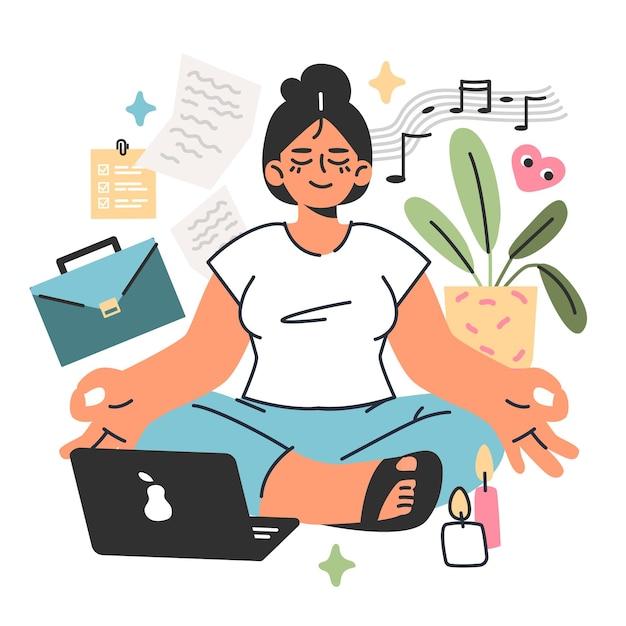In today’s fast-paced world, it’s easy to get caught up in the frenzy of work and overlook the crucial need for self-care. We all know that in order to perform our best, we must maintain a balance between work and personal life. But how do we achieve this equilibrium? What are some strategies that can help us prioritize self-care at work? Join me as we explore some useful ideas for maintaining work-life balance, why self-care is essential for achieving this balance, and how to implement a 5-step plan to take care of ourselves while juggling work demands. So sit back, relax and let’s dive into the world of finding true harmony between work and life.
“Self Care: The Importance of Taking Breaks”
We all have busy lives- there’s work, chores, family time and more to juggle. In the midst of it all, we often forget to take a break, or worse, feel guilty for doing so. However, taking a personal break is not a luxury, but a necessity. Here’s why you should prioritize self-care in your work-life balance:
Boosts Productivity
Studies show that taking regular breaks at work improves focus and productivity. This doesn’t mean you should procrastinate by scrolling through Instagram every hour. Instead, take a quick walk or a chat with a colleague to refresh your mind. Stepping away from work for a few moments helps prevent burnout and enhances mental clarity.
Improves Physical Health
Sitting in front of a screen for long durations can take a toll on your physical well-being. Taking small breaks can help you stretch out and refresh your body. From taking the stairs to going for a jog, physical activity can enhance your health and mood while breaking away from a sedentary work-life.
Reduces Stress
We all have experienced stress at some point- from meeting deadlines to attending meetings. This can lead to a host of physical and mental health problems. Taking a personal break for self-care can include breathing exercises, meditation or a quick yoga session. These simple acts of self-care can significantly reduce stress and increase your emotional and mental well-being.
Fosters Creativity
Being creative comes in handy in various fields. Taking breaks that allow for creativity can positively impact your work while reducing burnout. Drawing, journaling and taking a walk in nature can all help stimulate creative thinking and provide fresh perspectives on old problems.
Self-care in work-life is essential, not a luxury. It’s easy to forget to take a break or feel guilty doing so, but the benefits of self-care far outweigh the costs. By prioritizing self-care, you can boost productivity, improve physical and emotional well-being, reduce stress, foster creativity, and have a happier work-life balance. Remember, taking personal breaks isn’t laziness – it’s an investment in your future career and overall well-being.
Ideas for Practicing Self-Care at Work
Work can be stressful, and it’s easy to forget to take care of yourself when you’re busy. Here are some quick and easy ideas for practicing self-care at work:
Take a Break
Taking a break is essential for recharging and clearing your mind. Take a walk around the office, garden, or any nearby park. Staring at your computer screen for hours can have a negative impact on your eyesight, so look away from the screen and focus on a spot in the distance to give your eyes a rest. Alternatively, simply take a few deep breaths, stand up and stretch for a few minutes to ease tension in your neck and shoulders.
Keep a Plant
Keeping a plant on your desk not only brightens up your workspace, but it also has some health benefits. Plants are known to purify the air by removing toxins, and they can help reduce stress levels.
Stay Hydrated
It is essential always to have a water bottle close by to keep you hydrated throughout the day. Dehydration can cause headaches and fatigue, which are counterproductive to productivity. Drinking water also helps flush out toxins and improve overall health.
Disconnect During Breaks
Take a few moments during your break to disconnect entirely from work. Scroll through social media, watch a funny video, or catch up on your favorite online series. This helps you to recharge during the break and come back more focused and motivated.
Get Organized
The chaos of a cluttered workspace can be overwhelming. Keeping your workspace organized can help to reduce stress and increase productivity. Take a few minutes at the start and end of each workday to organize your desk and dispose of items you no longer need.
Take a Mental Health Day
Sometimes the best solution is to take an unscheduled day off. Whether you spend it binge-watching your favorite series, having a spa day, or simply relaxing at home, a mental health day can do wonders for your overall well-being.
Practicing self-care at work is crucial to staying healthy and productive. Incorporate these easy tips into your daily routine to reduce stress levels and stay motivated.
Work-Life Balance Examples
Finding a perfect balance between work and personal life is like trying to find a needle in a haystack. It’s hard to juggle the two successfully, but you’re not alone. Here are some relatable examples of work-life balance struggles:
The “Always On” Syndrome
Thanks to technology and remote working, we can be available 24/7. But when do you draw the line to protect your well-being? It’s essential to set boundaries, particularly when your workday ends. Turn off your notifications and make sure your colleagues know when it’s okay to reach you.
The “Workaholic”
We all know that one person who is married to their job. While passion for your work is commendable, it’s crucial to disconnect every once in a while. Take a break from work, and indulge in activities that make you happy, such as spending time with family, reading a book, or watching your favorite movie.
The “Parent-Work” Balance
When you have a family, you’re always on-the-go. Managing work, school drop-offs and pick-ups, meal preparations, and house chores can be overwhelming. It’s okay to ask for help, delegate responsibilities and have an open conversation with your employer about your schedule’s flexibility.
The “Me Time”
Making time for yourself is the holy grail of work-life balance. You don’t want to jeopardize your mental or physical health. So, whether it’s a short walk in the park, a yoga session, or a day at the spa, allocate some time every day to switch off and recharge your batteries.
The “Social Butterfly”
Your social life enables you to connect with other people, experience new things, and unwind after a long day at work. However, maintaining your social life can be challenging. Find creative ways to balance your job demands with your social life. For example, you can schedule calls or meetings earlier or later in the day to create time for your social engagements.
In summary, finding a work-life balance takes time, effort, and commitment. Don’t forget to prioritize your well-being; after all, the cliché is true – a healthier, happier you means a better employee.
How to Achieve Work-Life Balance in 5 Steps
As the world keeps getting busier and busier, finding a balance between work and leisure becomes increasingly challenging. Balancing the demands of work and life can be tricky, but it’s achievable. Here are five simple steps to achieve work-life balance.
Step 1. Evaluate Your Priorities
The first thing you should do is assess your values and priorities. Create a list of the things that matter most to you and be honest about how much time you spend on them. This will help you to identify areas where you can cut back and make room for other important things.
Step 2. Set Boundaries
Knowing your limits and setting boundaries are crucial when you’re trying to achieve work-life balance. Communicate with your colleagues and loved ones about what you can and cannot do. Don’t let work or other responsibilities dominate your life.
Step 3. Learn to Say No
It’s alright to say no sometimes. If you’re already overwhelmed and someone asks you to take on more, it’s perfectly okay to decline. Don’t feel guilty about it.
Step 4. Take Time for Yourself
Taking a break is essential for staying healthy and productive. Do something you enjoy, whether it’s reading, hiking, cycling, or watching your favorite TV show. Make time for hobbies and other interests to help you recharge.
Step 5. Stay Organized
Disorganization can cause stress and anxiety, which are major obstacles to achieving work-life balance. Stay organized and maintain a to-do list, so you can keep track of your priorities and deadlines.
Wrapping Up
Achieving work-life balance is a continuous process, and it takes time and effort to accomplish. By prioritizing your needs, setting boundaries, learning to say no, taking time for yourself, and staying organized, you are well on your way to a balanced life. Remember that it’s okay to make mistakes and that balance is not a one-size-fits-all concept.
Why Prioritizing Self-Care is Crucial for Work-Life Balance
Do you ever feel like you’re constantly running on empty, trying to balance work, social life, family responsibilities, and everything in between? It can be overwhelming, to say the least. That’s why self-care is so important – it allows you to take a step back, recharge your batteries, and approach everything with a fresh, clear mindset.
Prevents Burnout
Juggling multiple responsibilities without taking time for oneself can lead to burnout, both physically and mentally. Burnout can sneak up on you and leave you feeling exhausted, unproductive, and unmotivated. Taking breaks and nurturing yourself can help prevent burnout and keep you feeling energized and motivated to tackle whatever life throws your way.
Enhances Mental Health
Self-care is not only necessary for physical well-being but also for mental health. Taking time to care for ourselves allows us to decompress, de-stress and rejuvenate our mind, which helps to reduce anxiety and depression. You’ll find that you’re able to approach your work and daily life with a more positive outlook, which will lead to better decision-making and increased productivity.
Boosts Productivity
When you take the time to care for your physical, mental, and emotional needs, you’ll find that your productivity will naturally increase. You’ll be able to focus better, be more creative, and tackle tasks without feeling overwhelmed. A little self-care goes a long way in enhancing productivity.
Better Work-Life Balance
Prioritizing self-care helps you establish a healthy work-life balance. You don’t need to sacrifice your personal life or work long hours to be successful. By taking time to care for yourself, you’re creating the space to be present in both your personal and professional life.
In conclusion, making self-care a priority is crucial for work-life balance. It allows you to prevent burnout, enhances your mental and physical health, boosts productivity, and establishes a healthy work-life balance. Remember to take time for yourself, whether it’s exercise, meditation, or just spending time with loved ones – your mind and body will thank you.
How to Maintain a Work-Life Balance like a Pro
When it comes to achieving a work-life balance, we’d all like to think we have it down pat. But let’s be real – it’s a constant struggle to juggle your demanding job and still maintain a fulfilling life outside the office. In this section, we’ll explore some proven ways to help you achieve a healthy balance.
Set Boundaries
The first step to maintaining a work-life balance is to set some boundaries. Decide when you’ll stop checking emails or taking work calls, and stick to it. It’s essential to strike a balance between being available and being off the clock. Also, make sure to communicate your needs with your colleagues. They may not know you can’t work after hours unless you tell them.
Prioritize Self Care
You can’t pour from an empty cup, so ensure you’re taking care of yourself first. Make time for things that help you unwind and de-stress, like running a warm bath or practicing yoga. You’ll notice you’re more productive and alert at work when you carve out some time to recharge.
Avoid Multitasking
Multitasking may feel like the ultimate hack to getting things done, but in reality, it’s a recipe for burnout. Focus on one task at a time and avoid going back and forth between them.
Learn to Say No
It’s challenging to say no when you’re trying to prove you’re a team player, but prioritizing your time means denying some requests. Be honest with your colleagues and prioritize your workload to achieve your overall goals effectively.
Plan Ahead
Design a schedule that works for you and stick to it. Time management skills help you keep a work-life balance. Create a to-do list and start with the most important tasks for the day, so you’re not overwhelmed by the number of things on your plate.
Take Breaks
It’s critical to take breaks throughout the workday to reduce stress levels. Step away from your desk to recharge your batteries and take a few deep breaths to feel better.
In conclusion, maintaining a work-life balance is an ongoing challenge, but it can be done with discipline and effort. By setting boundaries, prioritizing self-care, avoiding multitasking, learning to say no, planning ahead, and taking breaks, you’ll enjoy a fulfilling personal life and be more productive at work.
How Are You Taking Care of Yourself and Managing Work-Life Balance
Are you constantly feeling overwhelmed with work? Are you working longer hours, skipping meals, or sacrificing your personal time to meet work deadlines? If yes, then it’s safe to say you’re struggling to manage your work-life balance. In the long run, neglecting your self-care can lead to burnout, stress, anxiety, and even physical ailments. Here are some tips to help you take care of yourself while maintaining a healthy work-life balance.
Prioritize Your Health
You can’t pour from an empty cup. It’s essential to prioritize your health and well-being above everything else. Make sure you’re getting enough sleep, eating a balanced diet, and exercising regularly. Schedule in some “me-time” to practice mindfulness, yoga, or any form of physical activity that rejuvenates your mind and body.
Plan Your Day
Don’t let your work dictate your day. Plan your schedule in advance, and prioritize important tasks that need to be done. You can also consider time-blocking to ensure you have enough time for work, personal tasks, and relaxation. Set realistic expectations, and don’t be too hard on yourself when things don’t go as planned.
Learn to Say No
It’s okay to say no sometimes. Learn to set boundaries, and don’t feel obliged to say yes to every request. Prioritize your work, and decline non-essential tasks that could compromise your work-life balance.
Unplug From Work
When you’re done with work, unplug and disconnect from technology. Resist the urge to check your work emails or respond to work calls outside of working hours. It’s important to have a clear separation of work and personal time.
Don’t Be Too Hard on Yourself
Lastly, don’t be too hard on yourself. Remember to be kind to yourself, take breaks when needed, and acknowledge your achievements. Striving for perfection can be exhausting, and it’s important to recognize when you’ve done your best.
In conclusion, taking care of yourself and maintaining a healthy work-life balance should be a top priority. By prioritizing your health, planning your day, learning to say no, unplugging from work, and not being too hard on yourself, you can achieve a balanced lifestyle that benefits both your personal and professional life.


